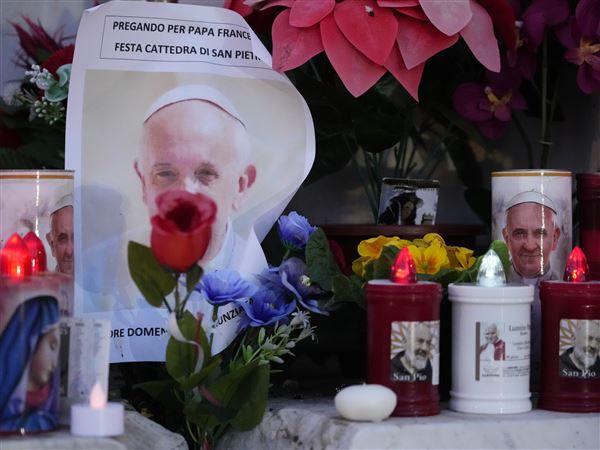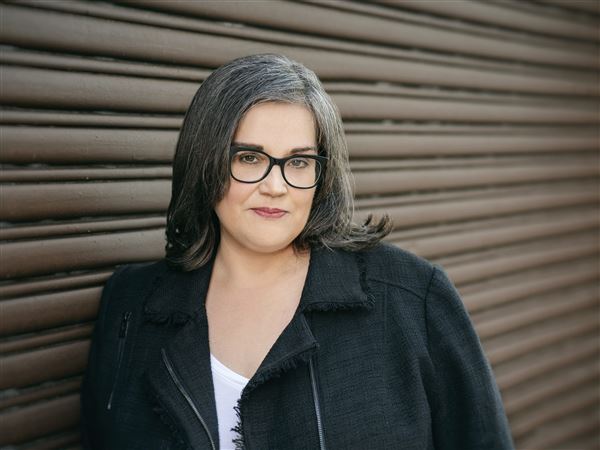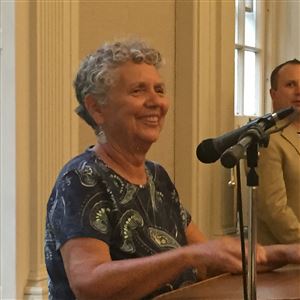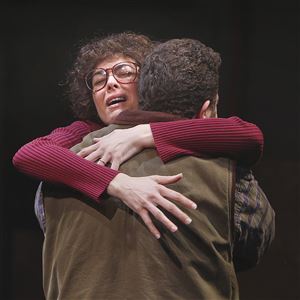On a rainy Sunday afternoon, Molly Rush couldn’t stop smiling.
The sunny weather her friends would’ve preferred for the garden party they were throwing in her honor gave way to overcast skies and occasional downpours. Through it all, Rush, who turned 85 this year, was unbothered.
Most of the nearly 40 people who gathered in a Point Breeze backyard to celebrate the peace activist’s remarkable life have known her for decades. Many are supporters of the nearby Thomas Merton Center, which Rush co-founded in 1972 with Larry Kessler.
And they are angry that the group has erased Rush from its history as it prepares to celebrate its golden anniversary.
Whether she wanted it or not, Rush became the face of Pittsburgh’s peace movement, especially those focused on the nuclear arms race between the U.S. and the Soviet Union. They honor her for being a member the Plowshares Eight, whose 1980 act of civil disobedience at a Montgomery County nuclear weapons plant resulted in 78 days in jail.
It was the height of the Cold War, and few Americans were optimistic that a Ronald Reagan presidency would lessen the probability of a hot war with the Soviet Union. On Sept. 9, 1980, Rush and seven others — brothers Daniel and Philip Berrigan, Carl Kabat, Elmer Mass, Anne Montgomery, John Schuchardt and Dean Hammer — were able to elude security and break into a GE plant in King of Prussia. They targeted the plant because guidance systems for intercontinental ballistic missile warheads were made there.
Rush and her compatriots wasted no time staging a symbolic protest on the premises. Following the biblical mandate to “pound swords into plowshares,” the group assaulted the cone of a missile with hammers. When guards heard the commotion, they converged on the protesters, arresting and detaining them for authorities.
Rush, who lived in Dormont, was tried, convicted and sentenced to 2-5 years in prison. After a decade of appeals, she was re-sentenced to time served — the 11 weeks she had already spent in jail after her trial.
The Plowshares Eight were hailed as heroes of the peace movement because of their willingness to go beyond the usual rhetoric. Rush experienced fallout within her extended family as she rose to national prominence. But her actions also raised awareness of the Thomas Merton Center, resulting in a fresh crop of volunteers, as well as moral and financial support, locally and from across the country. Celebrities such as Martin Sheen became big supporters, and its annual awards dinner attracted Noam Chomsky, Wendell Berry, Angela Davis, Howard Zinn, Richard Rohr and Studs Terkel.
The center, which was already a respected local peace organization, was named for Thomas Merton (1915-1968), a Catholic Trappist monk, writer, theologian, poet and social activist. After Rush’s arrest, the center began generating a national following. Much of its operational budget was raised by tickets sold to the annual awards dinner.
So why doesn’t the Thomas Merton Center’s website contain even a passing reference to Rush? It is the kind of ahistorical distortion of basic truth that continues to generate anger.
Pittsburgh-area writer Dan Kovalik, the author of the recently released “Cancel This Book: The Progressive Case Against Cancel Culture,” devotes an entire chapter to Rush and the Merton Center. Kovalik, who attended the garden party, described the incident last summer in his book:
“Molly, a naive user of Facebook, saw a meme that, on the spur of the moment, she decided to repost. The meme contained a photo of Martin Luther King Jr. and stated: ‘Looted nothing, Burned nothing, Attacked no one, Changed the World.’
“Quickly, comments to Molly’s post came forward, many criticizing this repost as insensitive to the context of the present moment, with others claiming it rose to the level of ‘racist.’ In response, Molly took down the post and issued a public apology on Facebook, stating, ‘I apologize for the hasty post about Dr. King. I’ve learned a lot. Thank you, friends.’
“She also met personally with the board of the [Thomas Merton Center], with which she is no longer officially associated but with which she still does political work, and she apologized to them.”
As Kovalik chronicles in his book and Rush corroborated in an interview, the more she apologized on Facebook and on social media, the more her critics piled on with accusations of racism and unconscious bias on her part and her white allies.
Many of her harshest critics were younger peace activists, most of them white, who constitute the Merton Center’s current leadership and membership. The attacks have exasperated the octogenarian activist and her supporters — and created a rift within the organization.
The people who gathered at activist Ginny Hildebrand’s house to fete Rush on Aug. 1 were not only her friends, they have been the most consistent volunteers and financial supporters of the Thomas Merton Center for decades. They are the financial spine of the organization. They are active and retired white-collar professionals, artists, teachers, professors, social workers and nonconformists of all stripes. And they have withheld financial support from the Merton Center since last year, when Rush was bounced from the editorial board of its newspaper.
They insist that scrubbing Rush’s name from the center’s history on its website is a colossally misguided attempt to rewrite history that is already too ingrained in the region’s memory to be easily dislodged.
Many of the younger activists who now run the Merton Center consider the older generation arrogant and out of touch. They insist that there was “real pain” as a result of Rush’s Facebook post and that it has been glossed over too quickly by those rushing to the activist’s defense.
Gabriel McMorland, executive director of the Thomas Merton Center since 2017, said Rush’s name will be restored to the website.
“When we finish redesigning the website, Molly will be featured in the ‘our history’ section as co-founder and a central person in many historic events,” he said.
He didn’t offer an explanation as to why she was erased but added:
“I’d love to assemble a rich anthology of artifacts and stories from a lot of people involved in TMC’s remarkable history, including Molly,” McMorland said. “That said, our current board and staff need to be able to moderate the final content.”
The leadership and general membership of the Garfield-based organization has never been as diverse as it is now, though the core of the organization’s leadership remains overwhelming white. It has never had a nonwhite director.
Even those who are angry about the Merton Center’s handling of Rush continue to laud the organization’s progressive causes and actions. Their anger is primarily directed at how Rush has been treated in the last year. It is a quality — and quantity — of anger that will impact both the 50th-anniversary celebration and the center’s existence if it fails to replace the donors and contributors who have bailed on it.
At the Sunday afternoon garden party, union organizer and musician Mike Stout and host Hildebrand played songs for Rush, including a tribute to the recently deceased Anne Feeney, a longtime friend of the guest of honor and their community.
“Have you been to jail for justice?” Stout sang. “If you have, I wanna shake your hand.
“Everyone knows where Anne would’ve stood on the coup d’etat that happened at the Merton Center,” he said adjusting his guitar. A gentleman who bore more than a passing resemblance to the folk singer Pete Seeger sat on the steps of the porch cheering him on.
There was laughter and tales of past protests that seemed to make the guest of honor, who is famously modest and uncomfortable when being publicly praised, shake her head as the memories flooded over her. She seemed most at ease when the tributes shifted to other people and causes.
Activist Lisa Valanti made an extensive plea to remember Cuba during its time of crisis. Jules Lobel made an impassioned plea for the renewal of a left movement in Pittsburgh that was rooted in forgiveness and love more than ideology and hardball politics. There was a plea to remember Palestine.
Education activist Kipp Dawson brought down the house with a quip about “lesbian Trotskyites” being welcomed with open arms by Rush and the Merton Center when she landed in Pittsburgh decades ago. Holocaust survivor Edith Bell spoke movingly of Rush’s friendship, even as the rain threatened to drown out her small, frail voice that has sustained her for nearly a century. Meanwhile the wine, the vegetarian snacks and the shrimp flowed freely.
What was surprising was the sentiment that the sooner the Merton Center was back on track being a peacemaking organization among the city’s peacemakers, the sooner these older members would renew their commitment.
Sitting in the living room after the party, Rush was beatific and stoic. She admitted she had been hurt by the criticism but has had a lot of time to forgive her critics. She said she would love to participate in the 50th anniversary for obvious reasons — the center is as much her child as the six children she gave birth to.
“Molly is a highly influential, world-famous activist, and many people understandably see her as the face of the Thomas Merton Center, even after she left the board of directors at the end of 2018,” McMorland said. “Last summer, Molly was writing for our newspaper and starting to discuss plans for the 50th anniversary of the organization. After she publicly offended a lot of local Black activists and then refused to address the very public situation she caused, we didn’t see how to continue in that shared work without her addressing the situation.”
“Everyone makes mistakes,” he added. “I know I do all the time. After we make mistakes, we have a chance to restore balance and move towards repair. Mobilizing your network to demand that a predominantly white organization you founded takes your side in a public debate you started with Black activists is not a constructive follow-up to a mistake.
“I’m personally disappointed to see people close to Molly, many of whom I’ve admired, focus their energy on defending her from an imagined attack on her reputation instead of creatively addressing the impact of her actions.”
Tony Norman: tnorman@post-gazette.com or 412-263-1631.
First Published: August 20, 2021, 9:27 a.m.
Updated: August 20, 2021, 1:26 p.m.


















